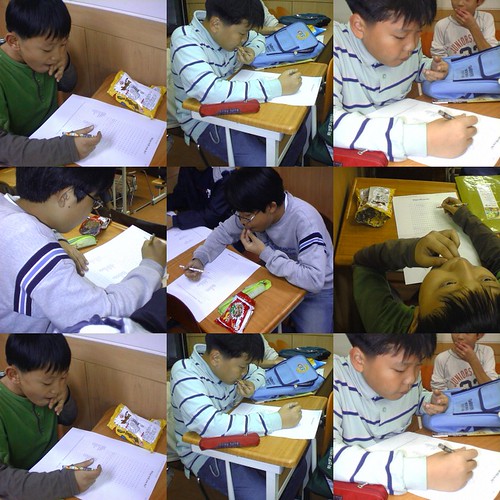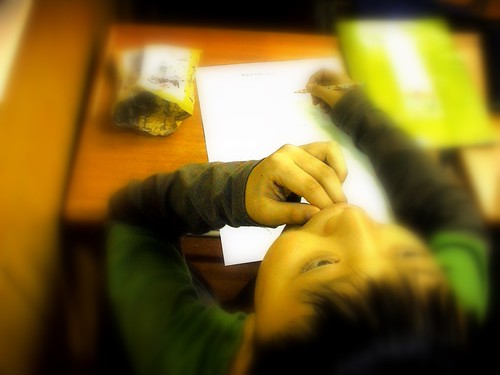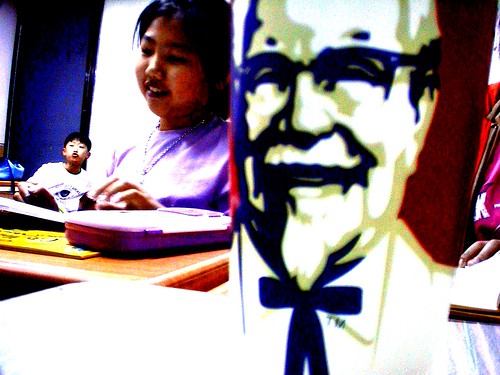
For the last two hundred years especially, and especially the last generation, man has asked Nature for a divorce. We separated a long time ago, living in our square cells, driving in square boxes belching smoke. We ignore the sun and moon, and flick switches. Our feet feel shoes and carpets instead of grasses and soils. Our lips sting with coffee and cola, instead of sweet and smooth water. Our bodies bulge and sweat as we pour burgers and lagers down our throats. Our bodies have survived thousands of years of evolution, but our cancerous ways have led even our bodies to become foul and sick. The body and spirit, the soil and the atmosphere, of our home, our Earth, is filled with smoky trails, and snaking effluent.
We have asked Nature for a divorce time and time again, and Now, Nature will give it to us.
Will God help us, when the divorce between man and nature becomes manifest in our lifetime? It's a difficult question to answer, and the answer may not be in a language you understand (though I am sure you understand English). The best answer I can give is this one:
When we are divorced from nature, we are divorced from ourselves. If God lives in both, in all, then we are split. That means we are separated, not because of God, but because of our actions. We need to engage and connect with our world once more, through our being, through our spirit, through the light and truth of our being, not through stuff and toys.
And that's what I'd like to focus on here. On God, or rather, on the God that we've designed to suit our purposes. We may believe that our cars and planes serve us, as we go about our business, as we go to work and read the news, but we, the populations of the world, spend our energies breathing life into a myth. We fuel our machines, and run them over roads in order to buy and build cities and structures that have no future. We don't know it now, but our lives are in the service of machines, and the machines are based on oil. And the custodians of that oil, want us to put oil in our lamps, rather than the light of enlightenment, the light of Life.
Our God has been designed to suit our purposes. We pay money to our preachers, forgetting that the truth ought to be imparted for free, or else it is purchased truth, and thus, not real.
And our fantasy of God's greatest gift, is a bloody human blood sacrifice (as shown in the Passion of the Christ). A quivering, mutilated, bloody corpse. That's what we consider appropriate to our salvation. Grotesque amounts of suffering. Curiously, macabre as it is to suggest, perhaps our ultimate saving, if that is how events turn out, will only come after grosteque amounts of nuclear fire and holocaust.
Maybe that's what's required to get the human mind to educate itself. Massive suffering, massive unhappiness. We are far from being enlightened enough, most of us, to choose this path by means of intellectual power or spiritual insight. This is a terrible shame, but one we force ourselves, the lesser aswell as the greater among us, to endure.
It may not seem that way, for all the old words in the Bible seem to have remained with us, and just the same. But even in this single span of your life, your mind and moods have grown up since childhood. Only your faith, can stay the same, if you let it. If you will it. Your faith rules these thoughts and moods and designs. So if your faith has not changed, then neither have you.
The interplay between intentions and actions is in no area more important than it is in religion. Why? Because religion is another way of saying 'what we believe'. And after we believe something, we act. Therefore it's very important to know what our intentions are, to know what our beliefs are, and to ensure that both are synchronised, so that we have congruent actions.
This is clearly illustrated by the War in Iraq, which is officially a war sanctioned by fundamentalist Christians (who see Iraq as Babylon, and a very real good versus evil conflict), and then also sanctioned by moderates (many of whom are also Christians) who believe in 'democracy and freedom'.
In fact, the War in Iraq is a resource war, a war for oil power and oil access, waged on behalf of Exxon Mobil and CEO's. To the extent that this last sentence doesn't sit well with you, that's the extent of media and political indoctrination around this subject.

If you do research on this subject, interestingly enough, you may find yourself saying, "Well, maybe it's not about good versus evil. Maybe it's about making sure we don't have to pay more to fill our cars. Well, either way, it's okay with me."
That's where your belief system becomes one of convenience. We do, after all, whatever it's structure, believe what serves us best. Some Christians emphasise love. Others exercise violence. Some agree to disagree. Some violently, and murderously, act out their disagreements on these articles of faith.
Faith, in a way, is what we vest ourselves in. So if what we believe is attacked, or defiled, we believe our very selves (to the extent that we vest ourselves in our beliefs, and our beliefs are expressed through our lives). Even if we feel we aren't vested strongly in beliefs, we maintain a strong tribal 'us' and 'them' instinct. The easiest way to engage a conflict, is to label a companion an infidel, a traitor to all that you believe. Maybe that person has done nothing real, and imagined nothing to hurt you. But if you believe someone has wronged you, you will go to war with them, if that belief is strong enough. Even if you've never met, even if you can't speak their language. The idea is simple enough.
And people, are unfortunately, equally simple, and easy to manipulate. Faith and religion, after all, asks us not to think, not to consider consequences, only to accept and believe, especially when our leaders, who believe in our God, and apparently represent Him, lead us to war.
God bless America.

So whether our hearts or our wallets are really where our spirits lie, there's a more practical issue to consider. Many people believe that the greatest good any man can do for another, is give his life. Modelling Jesus, the greatest sacrifice a person can make, is to die for another person.
Let's think about that for a minute. If I wanted to wage a war, and I was a leader, wouldn't this philosophy be incredibly useful to me, especially if I convinced you your death meant something, was meaningful and you would be honored and remembered?
Let's look at a family situation. Let's say a mother is pregnant, and she is told that if she allows the baby to grow to full term, she will die. So either the baby must die, or she must. What should she do? What would you do? Many might argue that a good mother would give her child a chance at life.
What if the baby was already alive, and there was a limited amount of food and water. The child is, say 8 years old, and there is only enough food for one person, enough to last only a few days.
The Eskimos historically found themselves in this predicament. With survival in constant question, when babies were born in times of scarcity, they were killed.
Is that immoral or sensible? Let's say the mother killed herself. What life would that be, for a child, without a mother? And how would that child live in the world, knowing his mother had killed herself so that he might live? Perhaps this child would become a murderer, whenever he felt himself threatened, because he 'must live' at the expense of others.
And isn't that, implicitly what we believe? We can live and consume and do our thing, while the vast majority of people suffer and starve. We can oppress and attack, as long as we can maintain our easy lifestyles. Is that what we believe? It's not what I believe.
Wouldn't the best result be that the mother abort the baby, and then have another child, one she could lovingly raise and care for? In the same way, we need to abort our lousy lifestyles, our lousy ambitions, so that life, sustainable life, can continue around us.
There is a simple reason why war today is unthinkable. Because of the increasing threat of nuclear weapons. A war with nuclear weapons will directly impact on your and my survival, wherever you live, and after the radioactive dust has settled, the radiation will continue to gnaw at the living. Any warmongering attitudes in these times ought to be torn from leadership positions, rooted out of society. Instead, ordinary people and their leaders are becoming dishonest, bad mannered, and increasingly aggressive.
It's difficult to know these realities and have them bounce off Christians, whose beliefs are conversation stoppers. They can't be challenged, because their faith is not based on evidence.
Christians see a silver lining in a mushroom cloud. They even see, and want to see, their beliefs, their end times scenarios, fulfilled. Mushroom clouds, global warming, and greedy consumption. This is how we make our own homes, our bodies, our minds and our hearts, our gallows. Jails for ourselves and others. Not jails made of asphalt and iron, but furious winds and fire. It's in this scenario, of lunacy, that we do perhaps deserve what we believe into being. A blood Christ for all of us, as a species. That bloody Christ is you, it's me. Is that what we want?











 I saw an excellent movie last night, with Al Pacino. Shakespeare's The Merchant Of Venice. I might have gone out to Halloween gatherings around Seoul, but fortunately I had the excuse that I ran out of money. W20 000 cash towards a wedding gift, and W30 000 to pay for a meal between myself and two students. That generosity swung around later in the evening when I got dinner on the house, and a very good dinner too. I had just enough money to pay for my subway trip home (in coins) shortly before midnight.
I saw an excellent movie last night, with Al Pacino. Shakespeare's The Merchant Of Venice. I might have gone out to Halloween gatherings around Seoul, but fortunately I had the excuse that I ran out of money. W20 000 cash towards a wedding gift, and W30 000 to pay for a meal between myself and two students. That generosity swung around later in the evening when I got dinner on the house, and a very good dinner too. I had just enough money to pay for my subway trip home (in coins) shortly before midnight.
 Jesus had his tragedies and triumphs rolled into an incredible 33rd year. He was 33 when he 'saved the world'. My 33rd year has been equally - well, not equally - filled with contrasts.
Jesus had his tragedies and triumphs rolled into an incredible 33rd year. He was 33 when he 'saved the world'. My 33rd year has been equally - well, not equally - filled with contrasts.






